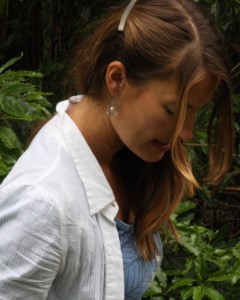Yellow Sweatered Woman | By Tara Goedjen

Yellow sweatered woman, I saw you before you started crying. You were walking up the street, toward town. I was on my way back from the trails along the cliff, from looking at the three sandstone sisters. You held the leash of a wrinkle-faced dog, and you had brown shoes and crooked legs and gray hair that met your shoulders. You were small and slightly hunched and your dog seemed to know that you couldn’t walk fast, although sometimes he would pull, ever so gently, on his ropey leash, his white paws speeding up into a trot. He saw me and halted protectively in front of you. Your yellow sweater, gray woolen skirt.
When I said hello, the dog ambled over and put his pink nose on my ankle.
Don’t sniff, you said in a Spanish accent. Maybe Chilean. Don’t you go sniffing. You scolded him lovingly.
But look at his face, he’s cute, I said.
She, you corrected. Cute, you said, as if amused. She wants to go for a walk, so we going to go for a walk. You know where I live? You pointed down the road. I left the house and this one started crying, you said. She wants to go for a walk, you repeated.
It’s a beautiful day, I said.
The sky was hard blue and warm. Your sweater was the color of sunshine on water.
Are you from here? you asked.
No, just traveling through.
I used to go all over the world, you said.
You shook your head, your face was close to mine. Your skin the winter skin of a face meant to be tanned.
I been here eight year. But sometime I want to move. Every winter. I get bored.
And you’re still here, I laughed.
Your yellow sweatered shoulders moved. My husband, he’s sick, you said. Dementia. He don’t want to go anywhere. He’s sitting on the porch now. On the veranda. The dog know it. The dog sometimes sit with him. She know something wrong. He used to take her for walks, now he can’t. Your face wrinkled, trying not to cry.
It hurt to listen. To watch. Do you have any kids?
Yes, a son down the road, a daughter in Sydney. My son, he pick up the groceries once a week. My daughter, she want to pay for a nurse. But I don’t want a stranger living in my house. I can take care of him. Your hand at your throat.
But maybe you could try it.
You looked at me, your eyes squinting in the bright day. He doesn’t even want to bathe. You were crying. Tiny breaths. I don’t know what to do, I’m inside all the time. I can’t go anywhere, he sick. The dog know it, you said again. Dogs know when someone sick. I have to take care of him.
Your dog waited, looking away from us, toward town.
Try, I said, you could try it. I imagined a nurse for you, I imagined you smiling again. But, maybe not.
I don’t know. Your eyes were wet. You tell me, I don’t know. My friends say: you need nurse for him. But I don’t know. I can still take care of him. My children help. He’s a good man, you said. All day he sits. You looked down, at the dog. She wants a walk.
I wanted to touch you, give you something. Anything.
Thanks, you said, but you weren’t looking at me, you were looking at the road.
I remember yelling out blessings! at the back of your yellow sweater. I turned away from you and your pale legs—your slow walk toward the cliff. I looked at the porches as I passed them on the street. All of them leading to houses, old and quaint. Gardens and flower pots in the yards. Bushes along the fences. Mowed lawns. The verandas were empty, all of them. There were two cats, black and gray, on a footpath, a young boy playing cricket. No one else. Every house had a porch with chairs, large and wicker, or wooden with pillows. All of them empty. The pillows on the chairs were indented, sunken, as if someone had been sitting there, and just gotten up and left.
*
NER Digital is a creative writing series for the web. Tara Goedjen’s fiction has appeared in journals such as AGNI, BOMB, Denver Quarterly, and NER (“The Orphans of Holy Week,” #31.4), and most recently in Fairy Tale Review and Meanjin. She is a PhD candidate at the University of Wollongong in Australia, where she is at work on a novel about ghosts.